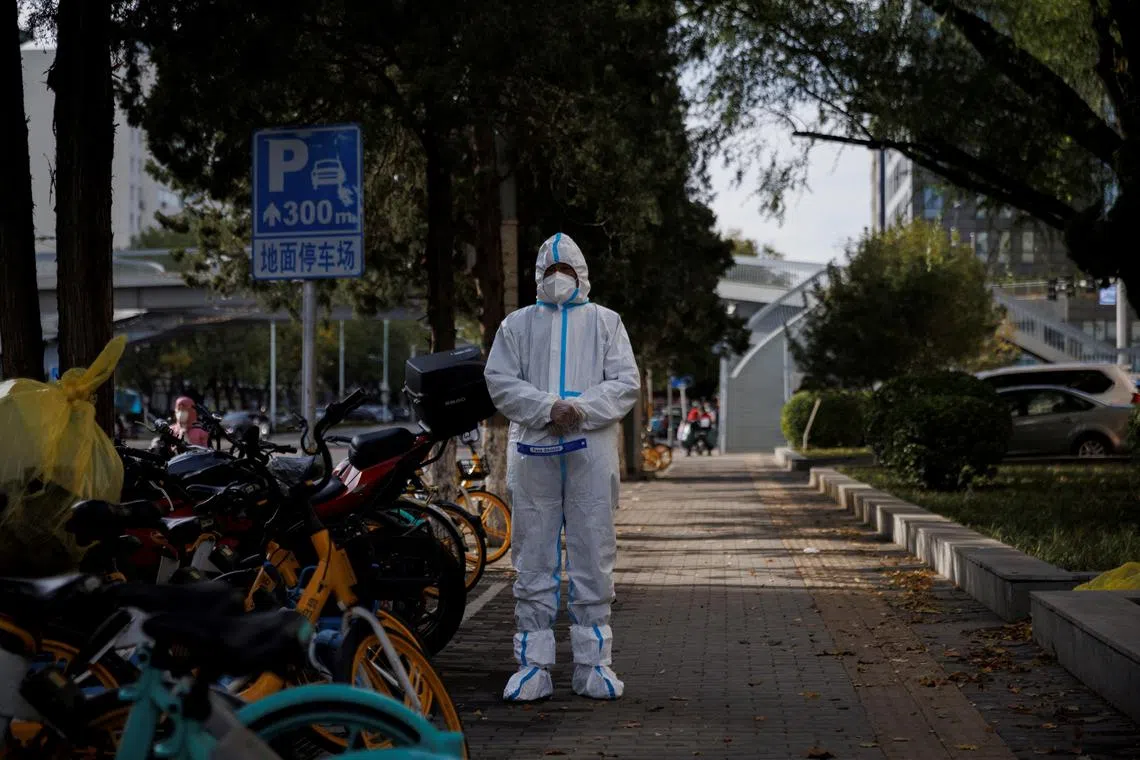China’s growth is ‘too slow’: Top state economist
Sign up now: Get ST's newsletters delivered to your inbox

A pandemic prevention worker in a protective suit stands outside an apartment compound in Beijing on Nov 12, 2022.
PHOTO: REUTERS
Zhang Yukun
Follow topic:
BEIJING - China’s economy has grown too slowly this year and is not in an appropriate range, Mr Yang Weimin, a member of the country’s top political consultative body, told the 13th Caixin Summit, highlighting the importance of striking a balance between development and regulation, as well as economic expansion and non-economic targets.
“The greatest risk in economic development these days is the too slow growth rate,” Mr Yang said in a video speech to a panel audience in Beijing on Friday.
High-quality development should balance quality and quantity, said Mr Yang, a deputy director of the economic committee of the national committee of the Chinese People’s Political Consultative Conference (CPPCC).
During the high-quality growth phase, China should keep its rate of economic expansion within an “appropriate range,” otherwise there would be “considerable impact” on the economy’s inner mechanism and future development, he said, adding that the continued excessively slow growth has to be reversed in time.
China’s top policymakers have repeatedly vowed to grow the economy in an appropriate range. However, the country’s GDP grew merely 3 per cent year-on-year in the first three quarters of 2022, well below its annual target of around 5.5 per cent, as waves of coronavirus outbreaks and strict containment measures in line with Beijing’s “zero-Covid” policy battered businesses, production and market expectations.
A year-long industry-wide property slump caused by tough regulation is also weighing on economic growth.
It’s difficult for China’s full-year growth to reach even 5 per cent, Liu Shijin, also a deputy director of the economic committee of the CPPCC, said during the same Caixin Summit panel. Mr Liu’s remarks echoed many economists who have said China will likely miss its annual growth target.
To stamp out infections in communities in line with the “zero-Covid” policy, local governments often apply stringent control measures, such as total or partial lockdowns, whenever there is an outbreak or even a small flare-up, dragging down economic growth.
From January to September, the three provincial-level regions on the Chinese mainland that saw their economies shrink year-on-year — Hainan, Shanghai and Jilin — have all experienced large-scale lockdowns at some point this year.
To propel China’s economic growth back to an appropriate range requires a dynamic balance between different targets, said Mr Yang. The economic growth rate can’t be the only indicator that matters, nor can China put any other indicator above everything else and sacrifice economic development, he said.
A balance between development and regulation also needs to be kept, according to Mr Yang. Regulation should be aimed at a healthier and more rule-based development of the regulated, and policymakers should stick to long-term goals instead of attempting to solve problems overnight, Mr Yang said.
Authorities can’t be blamed for making policies based on the perspectives of their own departments or localities, but they should also consider the broader impact of the policies they introduce, he said.
Chinese authorities have been tightening regulations on sectors including big tech and after-school tutoring, by and large dismantling the latter last year. These crackdowns contributed to China’s economic slowdown and high youth unemployment rate, as companies shrank their businesses, laid people off and slowed down hiring.
To motivate the private sector, there should be some political certainty, with improved policies to reverse business expectations, said Mr Yang. CAIXIN GLOBAL
This story was originally published by
Caixin Global.

